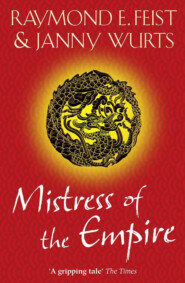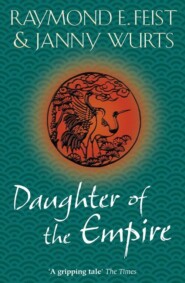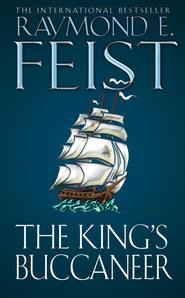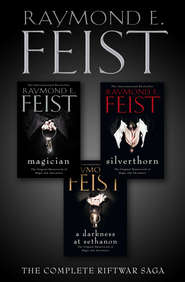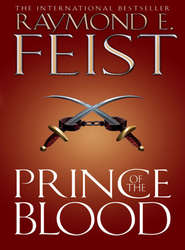По всем вопросам обращайтесь на: info@litportal.ru
(©) 2003-2024.
✖
The Complete Conclave of Shadows Trilogy: Talon of the Silver Hawk, King of Foxes, Exile’s Return
Автор
Год написания книги
2018
Настройки чтения
Размер шрифта
Высота строк
Поля
Kieli remembered his grandfather’s words and wondered if any boy actually had his name bestowed upon him by the gods. Examining the gourd, he judged he would be out of water by midday. He knew he would find water at a brook halfway down the path to the village, but he also knew that meant he had to leave the ledge when the sun was at its zenith.
He sat silently for a while, thoughts of his village dancing through his mind like the splashing foam of the brook behind the long hall. Perhaps if he set his mind free, he thought, if he didn’t try too hard to find his vision, it would come to him. He wanted to return soon, for he missed his family. His father, Elk’s Call At Dawn, was everything the boy hoped to be, strong, friendly, kind, resolute, fearless in battle, and gentle with his children. He missed his mother, Whisper Of The Night Wind, and his younger sister, Miliana, and most of all, he missed his older brother, Hand Of The Sun, who had returned from his own vision but two years earlier, his skin burned red by the sun, except for a pale print of his own hand where it had rested all day upon his chest. Their grandfather had joked that Hand was not the first boy to have come to his vision while asleep. Hand had always been kind to his younger brother and sister, taking care to watch over them when their mother was out gleaning the field, or showing them the best places to find ripening berries. Memories of those berries, crushed with honey and served on hot bread made his mouth water.
The celebration would be joyous, and the thought of the food that waited below gave Kieli cramps of hunger. He would be permitted to sit in the long house with the men, rather than in the round house with his mother and the other women and children. He felt a pang of loss at that thought, for the singing of the women as they oversaw the domestic chores of the day, their laughter and chatter, the gossip and the jokes, had been a part of his daily life for as long as he could remember. But he also looked forward with pride to being allowed to sit with the men of the clan.
His body shivered uncontrollably for a moment, then he sighed and relaxed as the sun warmed him further. He let his stiff muscles loosen, then moved to his knees and attended to the fire. He placed a few fresh twigs upon the glowing coals, then blew upon them, and in a few minutes it was done. He would let the flames die down after the mountain air warmed up, but for now he was thankful for the nearby heat.
He sat back against the rocks, which were warming with the sunlight despite the lingering chill in the air, and took another drink. Letting out a long sigh, he glanced at the sky. Why no vision? he wondered. Why had he received no message from the gods granting him his man’s name?
His name would be the key to his na’ha’tah, the secret nature of his being, that thing which only he and the gods would know. Other people would know his name, for he would proclaim it with pride, but no one would know the nature of his vision and what his name said to him, about his place in the universe, his mission from the gods, or his destiny. His grandfather had once told him that few men truly understood their na’ha’tah, even if they thought they did. The vision was only the first hint from the gods as to their plans for a man. Sometimes, his grandfather had said, the plan was a simple one, to be a good husband and father, a provider for the well-being of the village and the nation, an example for others to emulate, for it might be that his role was to be a father to someone chosen, a special one, a na’rif, and that plan would unfold long after a man’s death.
Kieli knew what his grandfather would say at this moment, that he worried too much, and that he should simply put aside worry and let the gods bring to him their will. Kieli knew his father would say the same, adding that to hunt or give counsel in the long house, or to be a good husband, first one must learn to be patient and to listen.
He closed his eyes and listened to the sounds of the breeze in the mountains. It spoke to him as leaves rustled in the cedars and pines. At times the wind could be a cruel companion, cutting through the heaviest of furs with a bitter, freezing edge. At other times it was blessed relief, cooling the hottest days of summer. His father had taught him of its voices and taught him that to learn the language of the wind was to be one with it, as were the hawks and eagles who built their nests among the craggy peaks. A screech split the morning air and Kieli’s head turned with a snap as a silver hawk struck at a rabbit less than a dozen yards from where he rested. The rarest of the hawks of the high mountains, its feathers were actually grey, with a mottling of near black around the head and shoulders, but an oily sheen upon the wings caused the bird to glisten with silver highlights when it sped through the clear sky. With a single beat of its wings, the hawk gripped the struggling rabbit tightly and launched itself into the air. Like a kitten carried by its mother, the rabbit hung limply from the bird’s talons, as if resigned to its fate. Kieli knew the animal had gone into shock – nature’s kindness as pain and thought were dulled. He had once seen a stag lying motionless on the ground, awaiting the hunter’s final mercy with a knife, felled by an arrow that hadn’t killed it.
In the distance he saw other birds wheeling lazily in the morning air, catching thermals off the rapidly heating rocks so that they could glide in search of a meal. Turkey buzzards, he knew. Their large wingspan allowed them to drift on the rising hot air while they scanned below for the dead and dying. Ungainly and ugly on the ground as they hopped to the carcass of a fallen animal, on the wing they were majestic.
To the south he saw a black-tailed kite balanced in mid-air, tail pointed downward while its wings beat quickly for two or three strokes, then halted to allow it to fall slightly, then beat again, to hold the kite in place above its intended kill. Then with stunning swiftness, it stooped, talons extended downward, and with precision bordering on the supernatural, struck the ground in a tight arc, lifting off without even a moment’s hesitation, a squealing vole clutched in its claws.
From the distance, forest sounds reached him. The rhythms of the day and night were different, and now the diurnal residents of the forests below were making their presence felt as their nocturnal neighbours sought out shelters in which to sleep. A woodpecker industriously sought out insects in the bark of a nearby tree. From the pattern of the sound, Kieli knew it was the large red-topped who was digging out his meal; his tapping was slow, thunderous and persistent, unlike the more dainty staccato of his smaller, blue-winged cousin.
The sun rose higher in the morning sky and soon the fire died, unneeded as the heat of day returned to the rocks. Kieli resisted the temptation to finish drinking the last of his water, for he knew that he must harbour it until he was ready to descend the trail. He could drink his fill at the creek below, but he had to get there first, and should he waste his water now, there was no guarantee he would safely reach the creek.
It was rare that a boy perished upon the peaks, but it had happened. The tribe prepared each boy as fully as possible, but those who had failed to survive the naming ordeal were considered to have been judged by the gods as lacking and their families’ mourning was a bitter counterpoint to the celebration of Midsummer.
The heat increased and the air dried, and suddenly Kieli realized a sa’tata was upon them. The wind from the north blew cold year round, but the summer western wind would grow hotter and dryer by the minute. The boy had seen grass turn brown and brittle in less than three days and fruit dry upon the branch from this wind. Men grew restless and women irritable when the sa’tata lingered more than a few days, and the skin itched. Kieli and his brother had swam in lakes and rivers on such days, only to be dry by the time they had returned to the village, as if they had not felt the cooling touch of water at all.
Kieli also knew he was now in danger, for the sa’tata would suck the moisture from his body if he remained. He glanced at the sky and realized he had only two more hours before midday. He glanced at the sun, now more than half-way along its climb to the mid-heaven, and he blinked as tears gathered in his eyes.
Kieli let his mind wander a few moments, as he wondered who would be chosen to sit at his side. For while Kieli lingered on the mountain, waiting for his vision from the gods, his father would be meeting with the father of one of the young girls of the local villages. There were three possible mates for Kieli from his own village: Rapanuana, Smoke In The Forest’s daughter; Janatua, Many Broken Spears’ daughter, and Eye of the Blue-Winged Teal, daughter of Sings To The Wind.
Eye of the Blue-Winged Teal was a year older, and had gained her woman’s name the year before, but there had been no boy of the right age in the local villages to pledge her to. This year there were six, including Kieli. She possessed a strange sense of humour that made Kieli wonder what she found funny most of the time. She often seemed amused by him and he felt awkward when she was near. Though he hid it well, he was more than a little scared of her. But Rapanuana was fat and illtempered, and Janatua was pinched-faced and shy to the point of being speechless around boys. Eye of the Blue-Winged Teal had a strong, tall body, and fierce, honey-coloured eyes that narrowed when she laughed. Her skin was lighter than the other girls’ and scattered with freckles, and her heart-shaped face was surrounded by a mane of hair the colour of summer’s wheat. He prayed to the gods that his father had met with her father the night before Midsummer, and not with one of the other girls’ fathers. Then with a surge of panic, he realized his father might have met with the father of one of the girls from close-by villages, the slow-witted Pialua or the pretty but always complaining Nandia!
He sighed. It was out of his hands. Stories were told of men and women who longed for one another, sagas told by the storytellers around the fire, many of them borrowed from singers from the lowlands as they passed through the mountains of the Orosini. Yet it was his people’s way that a father would choose a bride for his son, or a husband for his daughter. Occasionally a boy – no, he corrected himself, a man – would return from his god’s vision and discover that no bride waited to sit next to him at his manhood festival and he would have to wait another year for a bride. Rarely, a man would discover that no father wished his daughter wed to him and he would have to depart the village to find himself a wife, or resign himself to live alone. He had heard of a widow once whose father had died before her husband and she had taken one such man to her hut, but no one considered that a proper marriage.
He sighed again. He longed for this to be over. He wanted food and to rest in his own bed, and he wanted Eye of the Blue-Winged Teal, even though she made him uncomfortable.
Upwind he caught a sound he knew to be a sow bear with cubs. She sounded alarmed and Kieli knew her cubs would be scampering up a tree at her warning. Kieli sat up. What would alarm a black bear this close to the mountain? A big cat might, if a leopard or cougar were ranging nearby. They were too high up for the big cave lions. Maybe a wyvern was hunting, he thought, feeling suddenly small and vulnerable out on the face of the rocks.
A small cousin to a dragon, a wyvern could hold off half a dozen or more skilled warriors, so a boy with only a ceremonial dagger and a gourd of water would make a very satisfying break of fast for such a beast.
Hunting packs might frighten the sow bear; wild dogs and wolves usually avoided bears, but a cub was a manageable meal if they could draw the sow away from one of her babies.
Or it could be men.
In the distance the circle of buzzards grew and the boy got to his feet to gain a better view and was suddenly gripped with a light-headedness, for he had stood up too quickly. Steadying himself with one hand upon the rocks, he gazed into the distance. The sun was now high enough that the haze of morning had burned off and he could clearly see the buzzards and kites wheeling in the distance. Kieli’s sight was legendary in his village, for few could see as far as he, and none in the memory of his clan could see better. His grandfather joked that whatever else he lacked, he had a hawk’s eyes.
For a long moment Kieli’s eyes saw without him comprehending, then suddenly he realized the birds were circling over Kapoma village! Alarm shot up through him like a spark and without hesitation he started down the trail. Kapoma was the village nearest to his own.
There was only one possible explanation for so many carrion-eaters above Kapoma: a battle. He felt the panic rise up in him. Moreover, no one was clearing away the dead. If marauders were ranging through the valleys, Kulaam would be the next village they raided!
His mind reeled at the thought of his family fighting without him. Twice as a boy he had stayed in the round house with the women while the men had defended their village from attack. Once it had been a clan fight with the men from the village of Kahanama, and another time a goblin raiding-party had sought children for their unholy sacrifices, but the stout stockade had proven sufficient to repulse the invaders. Who could it be, he wondered as he stumbled down the path toward the trees below.
The moredhel – those the lowlanders called the Brotherhood of the Dark Path – had not been seen in these regions since his grandfather’s boyhood, and the trolls usually gave the villages of the Orosini a wide berth. There were no clan feuds currently being fought. The people who lived in the High Reaches to the north-east were currently peaceful and Latagore and the Duchy of Farinda to the south had no issues with the Orosini.
Raiders, then. Slavers from the City of Inaska or Watcher’s Point down in Miskalon would sometimes venture into the mountains. The tall, strong, red and blond-haired Orosini fetched high value on the slavers’ blocks down in the Empire of Great Kesh. Fear overtook Kieli: he felt it start to freeze his mind.
He drank what little water and herbs he had left, secured the gourd around his waist with a cord, then took half a dozen wobbly steps down the trail and lost his footing. Attempting to catch himself with his outstretched right hand, the youth fell and twisted, falling hard into a large rock. Pain shot through him and his head swam as he realized he had injured his left arm. It didn’t feel broken, but there was already a massive red mark running from his shoulder down to the elbow which would turn to a deep bruise. It hurt when he moved it. He tried to stand and his stomach heaved from the pain, and he sat down and vomited.
Kieli’s vision swam and the landscape turned a vivid yellow, and he fell back upon the road. The sky above turned brilliant white and the heat seared his face as he gazed upwards, his eyes gradually losing focus. The ground beneath him spun until everything was swept away as he fell through a tunnel into darkness.
Pain woke him. He opened his eyes as it seared through his left arm. His field of vision narrowed, contracting and expanding for a moment as dizziness washed through him. Then he saw it.
On his arm, flexing slightly, rested what looked like a spread talon. Kieli didn’t move his head, just shifted his eyes. Barely inches from his nose stood a silver hawk, one leg bent as it rested its talon upon his arm, its claws digging into the skin but not piercing it. Almost as if seeking to awake the stunned youth, the hawk flexed its claws again, dug deeper.
Kieli found himself looking into the bird’s black eyes. The bird’s claws tightened again and pain shot through his arm again. Kieli’s eyes locked on the birds, and then the words came. Rise, little brother. Rise and be a talon for your people. As you feel my talon upon your arm, remember you can hold and protect, or you can rend and revenge. Kieli heard the words in his mind. Suddenly he pushed himself upright and stood bearing the hawk on his arm. The bird’s wings flared as it kept its balance.
Pain was forgotten for a moment as Kieli stood facing the bird. The hawk stared back; then bobbed its head, as if nodding agreement. Their eyes locked once more and then with a screech the bird leapt upwards, a single snap of its wings taking it right past the young man’s ear. Kieli felt another slight pain and reached up to touch his right shoulder. His eyes saw upon his arm the pinprick marks of the bird’s claws.
Was this my vision? he wondered silently. No hawk had ever behaved so in the history of his people. Then, with a dull shock, he remembered his reason for hurrying down the mountain.
The heat of the day still baked the rocks around him. He felt weak and his left arm throbbed, but his mind was clear and he knew he would reach the creek. He picked his way carefully among the rocks, seeking good footing lest he fall again and suffer further injury. If there was a fight coming to his people, injured arm or not, he was now a man and would stand with his father, uncles and grandfather to defend his home.
Kieli stumbled down the dusty trail, his left arm sending jolts of agony up into his shoulder with every movement. He summoned up a chant, a mind-numbing exercise that would reduce the pain, and softly intoned it in rhythm. Soon he felt less pain, though the chant didn’t work as well as his grandfather had told him it would; his arm still hurt, but at least wasn’t making him dizzy from pain.
He reached the creek and fell forwards into it, his arm suddenly exploding in hot agony at that foolish choice. He gasped and was rewarded with a choking mouthful of water. Then he rolled over on his back and spat out water, clearing his nose as he sat up, coughing for a moment. At last he rolled over onto his knees and drank. He filled his gourd quickly, tied it again around his waist then resumed his journey.
He was starving, but the water had settled down his thinking. It was a two-hour walk to his village. If he ran at a steady pace, he would be there in a third of that time. But with his injured arm and in his weakened condition, he couldn’t sustain any sort of steady run. Below the creek he entered the heavy woodlands where he felt the day’s heat lessen and then settled for a fast walk, jogging over open stretches of trail, moving as quietly as he could, his mind focused on the coming struggle.
As he neared his village, Kieli heard the sounds of fighting. He smelled smoke. A woman’s scream pierced his heart as sharply as if a blade had struck. Could that be his own mother? No matter, he knew that whoever it was, it was a woman he had known all his life.
He took the ceremonial dagger and held it tightly in his right hand. How he wished he had two good arms and a sword or spear. In the heat of the day he had not felt the need for his usual clothing, though he had missed his cloak and tunic at night, but now he felt particularly vulnerable. Even so, he hurried along, the anticipation of the combat to come dulling the pain in his arm and forcing his fatigue aside.
Choking clouds of smoke accompanied by the sound of flames warned him of the devastation that greeted him a moment later. He reached the point in the trail where it left the woodlands and passed between the village’s large vegetable gardens before reaching the stockade. The gate was open, as it was during peaceful times. No enemy had ever attacked on Midsummer’s Day, which was a day of almost universal truce, even during time of war. The condition of the wooden walls and the surrounding earthen foundations below told the boy that the enemy had rushed through the gate before the alarm had sounded. Most of the villagers would have been in the central square, preparing the feast.
Everywhere was flame and smoke. He could see figures in the smoke, many on horse, and the outlines of bodies on the ground. Kieli paused. To run down the trail would make him a target. Better to circle along the line of the wood until reaching the point closest to the village, behind Many Fine Horses’ home.
As he moved to his right, he found the smoke blowing away from him. Now he could see the carnage in the village. Many of his friends lay motionless upon the ground. It was hard to make sense of the tableau before him.
Men on horseback, wearing various styles of clothing and armour rode through the village, several who were bearing torches firing the houses. Mercenaries or slavers, Kieli knew. Then he saw footmen wearing the tabard of the Duke of Olasko, ruler of the powerful duchy to the south-east. But why would they be aiding raiders in the mountains of the Orosini?
Reaching the back of Many Fine Horses’ home, Kieli crept along. He saw an Olaskan soldier lying motionless just beyond the edge of the building. Casting aside his dagger, Kieli decided to make a run for the man’s sword. If no one noticed, he would attempt to remove the round shield on the man’s left arm as well. It would hurt to carry the shield on his injured arm, but it could also mean the difference between life and death.
The sound of fighting was coming from the other side of the village, so he thought it possible he might be able to fall upon the invaders from behind. Creeping forwards, he retrieved the shield and sword and paused for a moment.
In the smoke, he could faintly discern figures moving in the distance, cries of outrage and pain drifted towards him, as his people struggled to repel the invaders.
His eyes smarted from the acrid smoke and he blinked back tears as he reached the fallen soldier. He turned over the body to retrieve the sword and as his hand fell upon the hilt, the soldier’s eyes snapped open. Kieli froze, and as he yanked back the sword the soldier lashed out with his shield, bashing him in the face.






